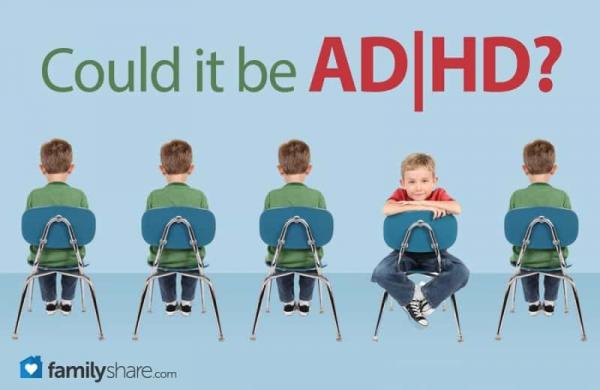
A couple of years ago I bought one of my daughters a T-shirt with the word DAYDREAMER appliquéd on the front. I thought it described her perfectly and when she saw it, she loved it. Fast forward two years, and now I know that my delightful daydreamer has ADD, a form of Attention Deficit Hyperactivity Disorder (ADHD).
If you or someone you love has trouble focusing, tends to procrastinate, is in constant motion, or loves new ideas but quickly loses interest in them, ADHDcould be a possibility. Educating yourself and your family about the disorder definitely is a journey, but it's worth it.
What is ADHD?
ADHD is a neuro-behavioral disorder that affects brain function in the pre-frontal cortex: the part of our brain that regulates mood, attention and impulse control. The "H"� is where some people get hung up:
The population at large refers to the disorder as ADHD but clinicians will tell you there are three sub-types of ADHD: inattentive, hyperactive-impulsive, and combined.
ADHD is usually genetically transmitted and according to the National Resource Center on ADHD, affects 5 to 8 percent of school-aged children and 2 to 4 percent of adults worldwide. It cannot be cured, but can be successfully managed.
What are the hallmarks?
Dr. Edward M. Hallowell describes individuals with ADHD as easily distracted, impulsive and sometimes hyperactive or overly energetic. They are go-getters; type A personalities; thrill seekers; bottom-line, gotta-run type people. They tend to procrastinate and are often scrambling. These traits are generally accompanied by unstable moods, difficulty transitioning between tasks, a low tolerance for boredom, daydreaming and forgetfulness. On the other hand, ADHD is also characterized by unusual compassion, intuition, innovation and perseverance and generally people with ADHD are very likable and fun.
Where do I begin?
Notice patterns
Although there is no one definitive test to diagnose AD|HD there are tools to help identify patterns, such as online quizzes regarding behavior over the last six months. Depending on your score you'll be given a suggestion to see a professional to receive a formal diagnosis. Check out psychcentral.com/addquiz.htm or help4adhd.org/en/treatment/scales to get pointed in the right direction.
Research
There are many books that will hold your hand through the journey of learning about the disorder. Dr. Edward M. Hallowall's Driven To Distraction is especially readable yet thorough. Taking Charge of ADHD by Russell Barkley and How to Reach and Teach Children with ADD/ADHD by Sandra Rief are very helpful. The National Resource on ADHD is another valuable resource.
Talk
Pick the brain of anyone who has been diagnosed with ADHD or has a child with it. Ask about coping mechanisms, suggestions on treatment, etc. Discuss your concerns with your family doctor.
How do we get a diagnosis?
Assessments
Once your family doctor knows your symptoms, they should provide you with a written assessment to be completed by you, your spouse, and in the case of a child, your child's teacher. Since ADHD is diagnosed by personal history, be thorough in recalling past behaviors. Then you will either be referred to a physician specializing in mental health disorders or told you may have tendencies but no true disorder. Remember, a disorder is anything that prohibits you from functioning normally in everyday life.
In the autobahn-like pace that is our society, it can seem like everyone has ADHD or some form of it. I once had an acquaintance "diagnose" my son as ADHD just for being a toddler. Take care not to label someone too quickly. A specializing physician is singularly qualified to pronounce a diagnosis and offer treatment.
Specialists
Once again, you'll fill out loads of paperwork but forge on. During an in-depth interview you'll be educated about the disorder, have your questions answered and receive treatment options such as counseling and medication. Consider the information carefully and prayerfully to know how to proceed.
How do we live with the diagnosis?
Explain
Now that you know you or your loved one has ADHD, or a type thereof, don't be afraid to explain it to those in your close circle. Ask them to accompany you on this journey with support and reassurance.
Some parents choose not to let their child or family circle know about the diagnosis. My husband and I decided on the path of full disclosure. Our 8-year-old was thrilled to know that ADD was not her fault and there were things she could do to help control her distractions and impulses. Regardless of how widely you share the diagnosis, let the person with ADHD know of your love and support.
Continue learning
Keep educating yourself about the disorder and different methods of living with it. Contact your local Children and Adults with Attention Deficit/Hyperactivity Disorder (CHADD) organization to gain encouragement and share ideas with others trying to manage ADHD. As a parent I've enjoyed Super-Parenting for ADD: An Innovative Approach to Raising Your Distracted Child by Edward M. Hallowell and Peter S. Jensen. Women with Attention Deficit Disorder: Embrace Your Differences and Transform Your Life by Sari Solden comes highly recommended for adults.
Many people will have opinions about ADHD, if the disorder is "real" or how to treat it, but focusing in on your doctor's recommendations and your own feelings will help keep you steady along the journey.

